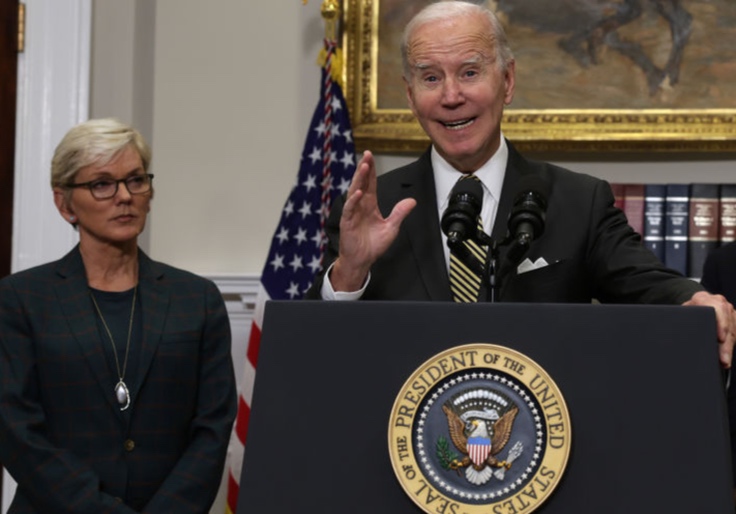The Biden administration is touting its decision to drain America's emergency oil reserves to historically low levels—and sell millions of barrels to China and other foreign entities—as one of its "top accomplishments in 2022."
President Joe Biden's Energy Department in a Dec. 23 press release included its release of "190 million barrels of oil from the Strategic Petroleum Reserve" as second on its list of top 2022 accomplishments. The department said the reserve sales protected "global energy security"—a far cry from its reasoning behind the sales in April, when the department said a release of 30 million reserve barrels would aid domestic consumers by addressing "the pain Americans are feeling at the pump."
The rhetorical shift comes after Biden faced bipartisan criticism for selling millions of reserve barrels to foreign entities, including the Chinese government. In April, Biden sold roughly one million barrels to Unipec, the trading arm of the China Petrochemical Corporation, which is wholly owned by the Chinese government. One month later, with domestic gas prices at record highs, more than five million U.S. reserve barrels were sent overseas to Europe and Asia, a move that Reuters said inhibited Biden's ability to "lower record pump prices" through the sales. As a result of those releases, the United States—which consumes roughly 20 million barrels of oil per day—holds just 372 million barrels, its lowest level since 1983.
Months after Biden's Chinese fire sale, House Republicans are pledging to stop Beijing from taking advantage of future releases once they elect a speaker and take control of the lower chamber. Rep. Steve Scalise (R., La.) on Friday released a slate of "meaningful, 'ready-to-go'" bills, including one that would bar the Energy Department from selling oil reserves "to any entity that is under the ownership, control, or influence of the Chinese Communist Party." "We wanted to start with some things on [the Strategic Petroleum Oil Reserve], which we've seen President Biden raid to cover for his failed policies," Scalise said.
The White House did not return a request for comment. The Energy Department defended its decision to drain America's oil reserves, saying the Biden administration "rightly authorized emergency use of the [Strategic Petroleum Reserve] mission to address supply disruptions—providing relief to American families and refineries when needed the most."
Beyond Biden's oil reserve sale to China, Republicans have accused the Democrat of using America's emergency oil supply—which is meant to be used as a national security tool in times of disaster or other threats—for political reasons. With the midterm elections just weeks away, Biden in October announced plans to release an additional 15 million barrels from the reserves, a move he said would help struggling Americans and "prevent oil price spikes." Energy experts, however, quickly said the release would not lead to lower gas prices, with former Energy Information Administration head Jay Hakes calling it "small potatoes." The Biden administration marked the end of the reserve releases a month after the midterms, even as Americans pay roughly a dollar more for a gallon of gas than they did when Biden took office.
"The mere fact that the administration stopped tapping the reserves immediately after the election says everything," Power the Future founder and executive director Daniel Turner told the Washington Free Beacon. "The only emergency it addressed was the emergency of losing the Senate majority."
While Biden has been quick to drain America's oil reserves, the Democrat campaigned in 2020 against domestic oil and gas production, promising to "end fossil fuel." Biden during his first month in office went on to cancel the Keystone XL pipeline and implement a moratorium on new gas leases on federal land.
